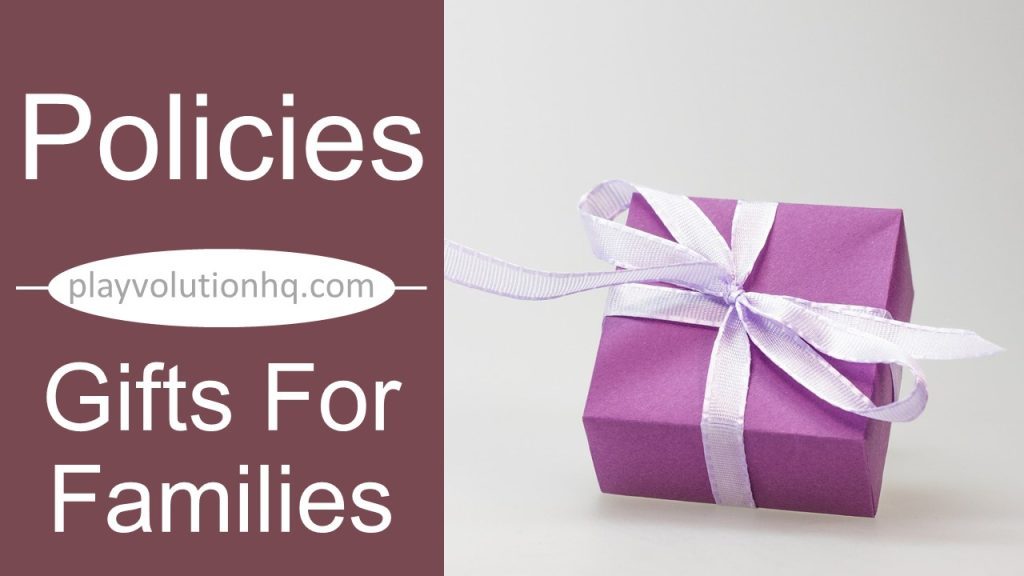
Gifts For Families Overview
Crafting policies about gifts for families is one way we, as educators, can look at what we value, why we value it, and how we put those values into practice. Humans are drawn to ritual, and the rituals of gift-giving are common in many cultures, especially the United States (and especially for children.) How do we blend these overarching cultures with the cultures of our classrooms?
This post is intended to spark reflection and suggest ways of addressing the topic covered when writing or updating policies and procedures. Your policies and procedures should be written to meet your program’s needs and unique circumstances.
Browse More Policy & Procedure Resources Here
There’s a lot to cover with gifts; I also have posts on gifts for teachers, as well as gifts for children.
In my first year of teaching young children, we created a twig Christmas tree (this was at a religious school) and crafted ornaments for it. I use the term ‘craft’ pretty loosely; I had purchased those empty plastic ball ornaments from the collar store, collected a mess of silver, white, red, and green things, and encouraged the children to stick stuff inside. I wrote their names on the ornaments, and told them that at before the holiday break, they could take them home.
Another teacher in the school saw what we were doing and told me to stop: “I’m already doing that as my parent gift.”
This is not the last time I saw the perverse reality of gifts for families. I have sat through hours of meetings where teachers compare photos from Pinterest to decide which craft each class will do (since either no class can have the same craft or every class has to have the same one). I have cut out exact sizes of white paper for students to glue on exact sizes of green and red paper. I have heard a teacher tell a student that their drawing wasn’t “Christmas-y enough” for Mommy and Daddy, so they needed to do a new one.

We don’t have to live like this. We don’t have to bribe children to stick their palms in paint and then press them down forcefully onto bulk-purchased canvas as we remind them that it won’t look pretty if they wiggle their fingers. We don’t have to spend hours formatting that poem about small handprints and growing up only to have a meltdown when the printer eats the expensive shimmer card stock we special ordered for this occasion.
I’ve heard many teachers talk about how they don’t want to do these kinds of things, but they’re expected to. Or they know it makes them look good, so they’ll suffer through weeks of finding glitter in their hair for the validation that comes from being told that the gift was “so cute!” I want more for you than this: let’s normalize validation for the work, not for the stuff.
I recognize that many schools have contexts or long-standing traditions where this kind of thing is “the way it’s done”, in which case I encourage thinking deeply about if the traditions serve staff and students in healthy ways. If there’s space to invite other ideas for parent gifts into the fold. What is it that you want these gifts for families to accomplish? What is it that parents want these gifts to accomplish? How can you celebrate the partnerships you have with families without turning December into a race-to-the-top arts-and-crafts spree?
My favorite parent gift was created on a typical Tuesday morning; it wasn’t related to anything in particular, it was just a young child who, after stringing beads on a pipe cleaner, said “this is a bracelet that I’m going to give to my mom.” The next morning at drop off, as the mom gave her child a hug goodbye, I noticed she was wearing it, the colors clashing with her work outfit, the love wrapped all around.
Where to Include
At Playvolution HQ, we recommend using the Three Handbook Method.
Consider adding this policy to your Operating Handbook.
Considerations
- I really can’t overstate how vital people find tradition to be in their work: if you’re looking to bring about a change in the way that gifts for families is approached, proceed slowly and with great care to ask lots of questions aimed at the thoughts behind them. Expect pushback from staff and families.
- Some holidays are geared towards specific people (Mothers, Fathers, Grandparents.) If you do expect gifts to be made for these occasions, how do you handle individuals with more than one mother or father, or a deceased parent or grandparent, or an estranged family member? In what ways could these gifts cause them pain, or create awkward situations?
Sample Policies
NOTE: The following samples are real-world examples relating to this post’s topic and are provided as a reference for creating your own policies and procedures. Sharing them here is not a recommendation of their content.
Sample 1
Child Parent Gifts
A gift is a thing given willingly to someone without payment; a present. A gift should be personal and therefore not chosen by adults. If a child wants to make their parents a gift, we willfully support them and provide them with whatever they request. Therefore, you probably will not receive a homemade gift from school.
Raising Stars Childcare, Minnesota, USA
Related Content


Brought to you by Explorations Early Learning
Contribute content to Playvolution HQ
Post Author
Student, teacher.


Leave a Reply